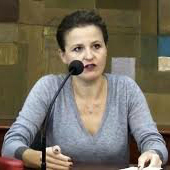Irena Kregar Šegota, International Relation Manager of the City Council for Culture of the City of Rijeka and the Executive Coordinator of the project „Rijeka 2020“ visited Novi Sad and on this occasion we talked about the importance of the European capital of culture.
How did it happen for Rijeka to candidate for the European Capital of Culture?
I was one of the people who proposed the idea to the Mayor, the team that lobbied. We felt that it would be very important for Rijeka to bear that title, and I am certainly very pleased that we were given support by the Mayor.
There was plenty of job, what was the first step?
The first step was defining and gathering resources in order to see with whom and what you can prepare such a large project. This is a demanding process that has two phases, pre-selection and selection. For both phases of the application you must prepare two bid-books, mobilize politicians and citizens, inform them and coax for the project. By resources I mean the whole creative capital that you need to gather, because you have to make one original vision and see in way your city will develop with the help of this project.
How did the public react to the first actions you applied?
The public in Rijeka was pretty skeptical, people were not familiar enough with the project and were insufficiently informed about what is expected from the city. However, they believed that the project could bring to the city a lot. Still, in the first phase they did not think that Rijeka has a good chance, especially when they heard that Dubrovnik is a candidate also, and it is already the European capital of culture with rich cultural heritage. You do not get the title of European Capital of Culture because of what you are, but because of a new vision for the city and the originality of what you offer. We believed from the beginning that we have something new to offer!
How and in what way were the citizens included in the process of creating the concept?
We have done a lot to engage citizens. They primarily should be informed about the project, which we did through a series of public consultations, round tables and information events. We have included artists, primary schools and kindergartens with the intention of make micro projects that would demonstrate how Rijeka might look like in 2020. Likewise, citizens, and above all cultural and creative sector have been invited to submit project ideas and their opinion on what we should offer in our bid-book.
What are the expectations of cultural workers and citizens, and what are the realistic possibilities that Title itself carries?
Expectations are, above all, that the city becomes more visible with more cultural programs, as well as to implement specific infrastructure projects so the city will get a new elan, the atmosphere and the increasing number of tourists. The cultural and creative sector expects better work opportunities in culture, in terms of better space, finance and capacity. We expect that this project will encourage new development of the city, lead to a new community and a new, bright atmosphere that we are all missing in the Balkans.
What is your message to the citizens of Novi Sad?
To support the team preparing the nomination, it is an extremely demanding job in which support is needed. And another thing, it is important to believe in the capacity of your city.



